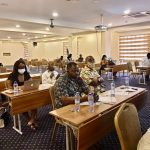A colleague shared the story of a suspected COVID-19 positive patient who was asked to self-isolate. This happened in a very big hospital in Accra. About four days later when the tests had been completed and a positive status had been confirmed, the hospital called the patient on phone and the answer to their question of the patient’s whereabout almost threw the nurses to the ceiling. He said he was in a taxi going to town. Wait, it gets even worse. The nurses asked him to inform the driver about the situation and request him to stop and keep all the passengers in the car and wait for the hospital staff to come and assess the situation. The man who had just been informed about his COVID status broke the news to the driver and passengers to their dismay. What the driver did next shocked all of them, he dropped off the passengers and drove away saying he has sales to account for.
The above intriguing story reveals how porous the containment strategy is for developing countries dealing with the COVID-19 pandemic. The big questions it raises are; 1. How do you self-isolate in our kind of environment and is a mandatory isolation policy possible? 2. What happens to the income needs of the majority whose livelihoods are based on daily struggles in the non-digital money world? 3. How does the fear of loss of income and other economic and social repercussions contribute to COVID-19 patients concealing their status from their neighbours?
The concept of self-isolation assumes conditions of improved housing and transportation conditions for most Ghanaians. Sadly this is not the case. Many Ghanaians find themselves in multi-family compound houses where they have to queue and compete for the bathroom door or use of the toilets. Families live in single or double rooms where it is clearly impossible to self-isolate. It is not possible. So how was this individual suspected to be COVID-19 positive supposed to self-isolate? The man travels using public transport (taxi or trotro) and was supposed to leave the hospital after the initial tests to his house that day. The approach that suggests only self-isolation for cases like this is flawed and negligent.
So what about the taxi driver who will not wait as directed by the health staff and drove off because of the sales he had to account for at the end of the day? There in that single taxi and that moment you had two persons who flouted directives for isolation; one had been told four days earlier, that he could be positive and the driver who bolted had just been told. The potential loss of economic opportunities is what most people fear if they had to be isolated or quarantined for days and therefore think less of the dangers they present to themselves and others if they do not comply. As sure as day follows night, any containment strategy that does not take realities like this into policy considerations will not be successful. The USA and other countries faced this reality frontally when they implemented a universal income policy and paid income to all persons whose finances had been affected by the COVID. If Ghana cannot go as far as a universal income for the COVID period, what about targeted income to isolated or quarantined COVID-19 patients? This is more about strengthening the “tracking-testing-isolating” strategy and less about the money patients receive. The closest alternative of mandatory isolation or quarantine will result in an even messier hide-and-seek games throughout the country.
People conceal all kinds of infectious ailments which they should not because of fear of an interrelated set of factors. Fear of discrimination, fear of stigma and fear of loss of economic and other opportunities. The fear of these factors is true for rich and poor alike. Recently, the leadership of Parliament complained about how they were finding it difficult to prevent COVID-19 infected MPs and staff from coming to Parliament because of the risk of infecting others. The Minister of Health was also reported as being hesitant to declare his status even though he had taken steps to be quarantined at the University of Ghana Medical Centre. It is alleged. So what does the taxi driver, the suspected COVID patient and the MPs have in common? They all have something to do, they have to irk out a living and by so doing, dangerously putting their lives and lives of others at risk.
Policymakers must recognise facts about human nature as it is and not how they wish it were. Suspected and confirmed cases of COVID-19 should ultimately be isolated or quarantined within temporal facilities created for the purpose, not in a forceful way but in a cooperative manner that identifies and shares the reasonable costs that will accrue to patients when confined. There should be targeted and reasonable assistance funds payment to patients whose finances will be negatively affected during their confinement. Of course, the MPs will not qualify, but their request could be considered.
Intensification of education and COVID-19 information provision will also be paramount. This is the main way lackluster attitudes or fear of discrimination could be reversed.



